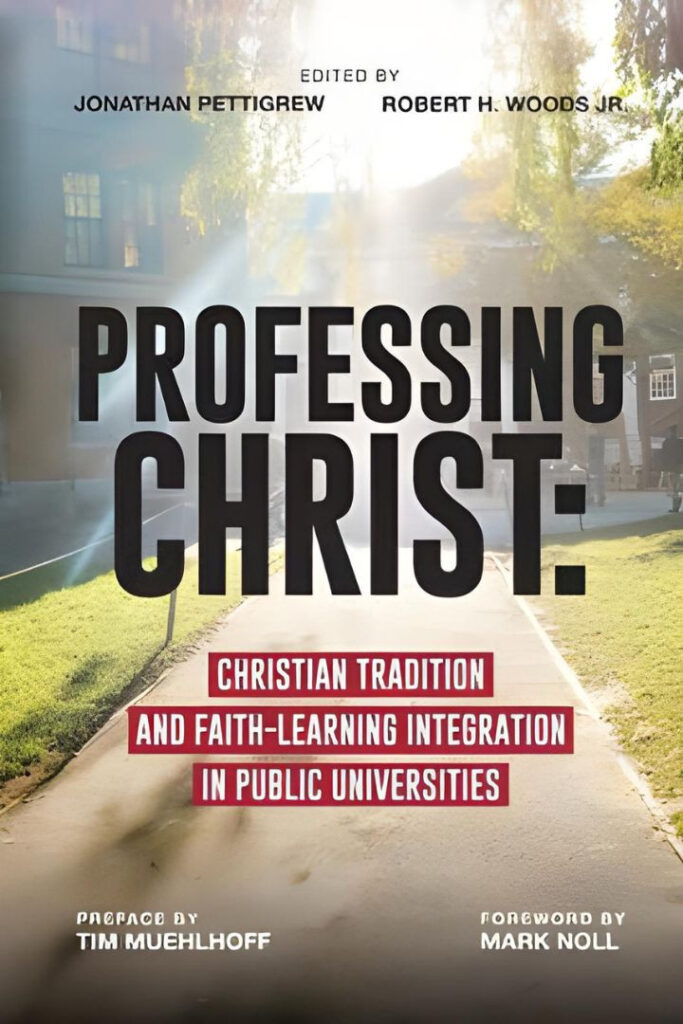‘If I fail as a professor to include religion and spirituality in my state-school syllabus, then I am doing a disservice to my students by omitting an integral aspect of the human condition and knowledge base’, writes professor Jonathan Pettigrew in his edited book Professing Christ.1 He understands that with great power comes great responsibility. University teaching is not just training students for a job, but educating them for a lifetime, for citizenship, and for a response to their Creator. ‘Professing’ in the halls of higher education is a high calling indeed, and scholars can do it either deliberately and creatively or unconsciously and poorly.
‘Professing’ in the halls of higher education is a high calling indeed, and scholars can do it either deliberately and creatively or unconsciously and poorly.
As a quick aside: Christian professors are not the only ones who profess a faith. Neither is it only the philosophy department professors. Every professor has basic commitments to metaphysics, ethics, and epistemology that steer their research, teaching, and writing. Whether atheists, theists, communists, pantheists, or agnostics, their faith will seep through. Maybe less so in mathematics than in social work, but both disciplines carry worldview commitments that are not derived directly from comprehensive evidence, the curriculum, or even conscious awareness. What is the nature of reality? What does it mean to be human? What is good, true, and beautiful? This cannot be dodged or feigned as objectivity anymore. I have written on worldview, Charles Taylor’s social imaginary, and James K. A. Smith’s cultural liturgies, all making the same point: there is no such thing as a culturally and religiously neutral education.

Christian professors can be fully conscious and intentional about how their faith shapes their work, and ideally, make the pluralistic university a better place to learn and grow for everyone. True Christian faith is bent towards shalom, and that is where justice and peace embrace for the benefit of the whole planet.
Christians in university faculty positions can profess the good news of Jesus through their pedagogy in the classroom, through faith-filled intellectual production, and in how they try to shape the culture of their institutions. Scholarship on the integration of faith and learning is growing, and of the making of such books there should be no end.2 We also have books featuring Christian professors’ testimonies.3
Christians in university faculty positions can profess the good news of Jesus through their pedagogy in the classroom, through faith-filled intellectual production, and in how they try to shape the culture of their institutions.

The recent book Professing Christ is a collection of essays that blends those two categories. It arises from the Christianity and Communication Studies Network (CCSN), which seeks to nurture ’a free, interactive community of scholars, teachers, and others interested in exploring questions at the intersection between Christianity and communication’. This is the sort of investigation that can be done in every discipline of the university, from anthropology to zoology. Being a Christian scholar is about more than writing books, however. Christian professors are very creative in how they demonstrate their faith in the university world.
Some pray constantly for their students and colleagues, and will even pray with them if the opportunity arises. Some have intentional Christian influence in their departments, across campus, or with peers in their field; some have even written key texts in the field that are read worldwide. Others get involved with campus ministries, chaplains, Christian think-tanks, or development organizations and partner in special lectures, panel discussions, or debates. The possibilities are endless for ways to serve the students, staff, faculty and administrators.
Being a witness for Jesus on a secular campus can be difficult, as the shadow of the church’s failure in matters of colonialism, slavery, or the oppression of women and sexual minorities looms large in debates on campus. Whether one agrees with the charges or not makes no difference. George Marsden comments in The Outrageous Idea of Christian Scholarship (Oxford University Press,1997) that many Christian professors self-censor in the public academy, because self- identifying as Christian can be a career risk. There is tentativeness in many professors’ witness on campus: some are very shy about their faith. Others, however, can be quite bold, as one scholar has adamantly insisted that her academic publications’ acknowledgement section must end with ‘To God be the glory’.4
many Christian professors self-censor in the public academy, because self- identifying as Christian can be a career risk.
Secular academic environments come with dominant worldviews, especially naturalistic and postmodern challenges with their respective challenges of atheism and identity politics. A certain consumerism reigns on some campuses, where the universities’ branding is most important, and students are referred to as if they were customers buying a product rather than persons to be trained for service in society. Jonathan Haidt and Greg Lukianoff, in The Coddling of the American Mind (Penguin Books, 2019), argue that the academy has been psychologized, and learning has been framed by a type of therapy that refuses ideas that are deemed ‘unsafe’. The bad ideas that plague the modern university need to be met with rigorous worldview analysis and solid Christian apologetics, and sadly this has not always been the case.5
As Christians called to ‘love the Lord your God with all your mind’, we share the vision of universities to pursue both knowledge and the common good. Christians worldwide need to affirm and defend the pluralistic context of the university, as a place where there can be religious freedom to speak into and study more deeply matters of faith. Making room for one’s neighbour is always making room for oneself, and good theology suggests that this will be our lot until kingdom come. In this line of thought, Nicholas Wolterstorff’s Religion in the University (Yale University Press, 2019) is a stellar resource—in fact, a manifesto—for unapologetic Christian scholarly life in a necessarily pluralistic and now postmodern public academy.
On the other hand, we should not simply bow to the competitive ‘publish or perish’ culture of the public university—its pressures, hierarchies, credentialing, and theoretical rivalries. Christians have a prophetic word to offer a world where ’making a name for oneself’ has become the epitome of professional performance.6 Young scholars especially can struggle emotionally, relationally, and spiritually when under such tremendous pressure to be smart, get tenure, or even be a public intellectual. Mental illness and burnout affects not only faculty, but students as well. If we take John 3:16 to heart, the call is not to publish or perish, but to enter into God’s love or perish. This invitation to wisdom and service in God’s world is a different orientation from the careerism that marks many universities today.

The good news is, as historian George Marsden and others have said, that there is a renaissance of Christian scholarship around the globe today. It includes Catholics, Lutherans, Presbyterians, Reformed, Mennonites, Baptists and evangelicals—all bringing their faith to bear in their research, teaching, and public service—in both public universities and in Christian higher education. When we work together as Christians, and take care to bring our academic neighbours close to us in building a hospitable university environment, we all come nearer to the kingdom of God.
Christian professors and those who minister to them need to network internationally and mobilize themselves for an intentional public witness in the academy that will in turn serve the church and bring shalom to the nation and the planet. As the university goes, so goes the culture, because the university is where the leaders of tomorrow will be trained and shaped for service. Only students taught to love justice, righteousness and peace can be bearers of justice, righteousness, and peace. For that to happen, professors must profess in a humbly bold way.
Resources
Nicholas Wolterstorff, Religion in the University, (New Haven, CT: Yale University Press, 2019).
Endnotes
- Jonathan Pettigrew, Professing Christ:Christian Tradition and Faith-learning Integration in Public Universities, (Pasco, WN: Integratio Press, 2022),117.
- Just a sample: Arthur Holmes, All Truth is God’s Truth, (Grand Rapids, MI:Eerdmans Pub Co.,1977); Albert Wolters, Creation Regained: Biblical Basics for a Reformational Worldview, (Grand Rapids, MI: Eerdmans Pub Co.,1985, 2005); Harold Heie and David L. Wolfe, The Reality of Christian Learning, (Grand Rapids, MI: W.B. Eerdmans Pub. Co.,1987); David W. Gill, Should God Get Tenure: Essays on Religion and Higher Education, (Grand Rapids, MI:Eerdmans Pub Co.,1997); Richard T. Hughes, How Christian Faith Can Sustain the Life of the Mind, (Grand Rapids, MI:Wm. B. Eerdmans Publishing,2001); Douglas Jacobsen and Rhonda H. Jacobsen, Scholarship and Christian Faith: Enlarging the Conversation, (Oxford, UK: Oxford University Press, 2004); Norman Klassen and Jens Zimmermann, The Passionate Intellect: Incarnational Humanism and the Future of University Education, (Grand Rapids, MI:Baker Academic,2006); Mark Noll, Jesus Christ and the Life of the Mind, (Grand Rapids, MI:Wm. B. Eerdmans Publishing,2011); Paul M. Gould, The Outrageous Idea of the Missional Professor, (Eugene, OR: Wipf & Stock,2014); Robert Sweetman, Tracing the Lines: Spiritual Exercise and the Gesture of Christian Scholarship, (Eugene, OR: Wipf & Stock,2016); Rick Hove and Heather Holleman, A Grander Story: An Invitation to Christian Professors, (Orlando, FL: Cru Press,2017); Todd C. Ream, Jerry Pattengale, and Christopher J. Devers, Public Intellectuals and the Common Good: Christian Thinking for Human Flourishing, (Lisle, IL: IVP Academic, 2021).
- Kelly Munroe, Finding God at Harvard: Spiritual Journeys of Christian Thinkers, (Grand Rapids, MI: Zondervan, 1996); Paul M. Anderson, Professors Who Believe: The Spiritual Journeys Of Christian Faculty,( Lisle, IL: IVP, 2006).
- George Marsden, The Outrageous Idea of Christian Scholarship, (Oxford: Oxford University Press,1997).
- Mark Noll. The Scandal of the Evangelical Mind, (Grand Rapids,MI:Eerdmans, 1995).
- Heather Holleman and Rick Hove, A Grander Story: An Invitation to Christian Professors, (Orlando, FL: Cru Press,2017).

